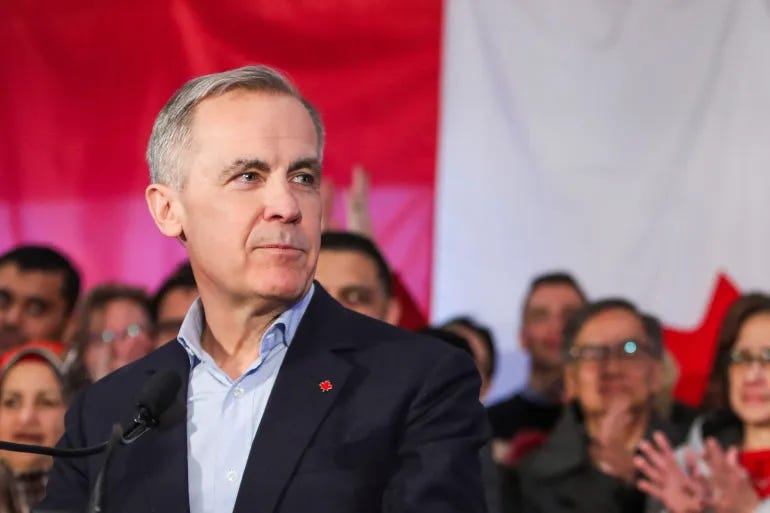Mark Carney Announces Bid to Lead Canada’s Liberal Party, Challenging Trudeau’s Legacy
Former Bank of Canada governor slams Conservative leader Pierre Poilievre and vows to strengthen Canada's economy
Mark Carney, the ex-Governor of the Bank of Canada, has officially thrown his hat into the ring to become the next leader of the Liberal Party, aiming to succeed Prime Minister Justin Trudeau.
Carney launched his leadership campaign in Edmonton, Alberta, on Thursday afternoon, in front of an enthusiastic crowd of supporters and Liberal Party officials.
“I’m back in Edmonton to declare my candidacy for leader of the Liberal Party and prime minister of Canada,” Carney, 59, announced. His candidacy makes him a prominent contender for the role, given his extensive experience in central banking. Carney served as the Governor of the Bank of Canada from 2008 to 2013 before taking the reins of the Bank of England, where he served until 2020.
Trudeau, under growing public pressure and declining support, announced earlier in January that he would step down, with the leadership contest set to conclude in March. Trudeau has promised to remain in office until his successor is chosen.
The Liberal Party is hopeful that a new leader can reverse its fortunes as it faces a tough battle in the upcoming federal election, which must take place before late October. Recent polling indicates that the Conservative Party, led by Pierre Poilievre, holds a commanding lead over the Liberals, who are facing widespread dissatisfaction amid rising living costs.
In addition to domestic challenges, the Liberal government is contending with external pressure, notably from the incoming U.S. administration of President-elect Donald Trump, who has threatened to impose heavy tariffs on Canadian goods.
Carney positioned himself as an outsider and highlighted the urgency of his leadership bid. “Too many Canadians are being left behind. Too many young people can’t afford homes. Too many can’t find a doctor,” he said. “And with Donald Trump set to become U.S. president in just four days, a man who threatens economic force on our closest allies, Canada cannot afford to wait.”
The former central banker also took aim at Poilievre, criticizing his rhetoric and approach. "When Pierre Poilievre says 'Canada is broken,' he’s not offering solutions — he’s laying the groundwork to destroy," Carney asserted. "The Conservatives' slogans will hurt ordinary Canadians, not help them."
Poilievre, who is expected to be the Conservatives' candidate for prime minister, responded by attacking Carney's record, particularly his support for the Trudeau government's carbon tax policies. He branded Carney as “Carbon Tax Carney” and promised to repeal the controversial carbon pricing if elected.
In turn, the Conservative Party accused Carney of being a long-time Liberal insider, dismissing his portrayal as an outsider. "Carbon Tax Carney is the furthest thing from an outsider. He’s part of the Liberal establishment that has failed Canadians," the party statement read.
The race for the Liberal leadership is heating up as other candidates, including Liberal MP Chandra Arya and businessman Frank Baylis, also enter the fray. However, the battle is expected to come down to Carney and Chrystia Freeland, the former Finance Minister and Trudeau ally. Freeland has yet to officially announce her candidacy but hinted at a leadership run following her resignation from the Trudeau cabinet in December, citing disagreements over the government’s approach to the impending Trump tariffs.
The Liberal Party is set to select its new leader, and Canada’s next prime minister, on March 9, just weeks before the House of Commons reconvenes. However, a no-confidence motion from the opposition could trigger an early election, leaving the political landscape in flux as Canada heads into this critical period.


